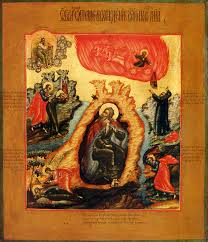Khanya (Orthodox Christians from South Africa)
And Elijah came unto all the people, and said, How long halt ye between two opinions? if the LORD be God, follow him: but if Baal, then follow him. And the people answered him not a word (I Kings 18:21).It seems to me that for many Christians the Gospel of Neoliberalism has replaced the Gospel of Jesus Christ.
I’ve known that for a long time, and have blogged about it before (here, and here, and here).
But today I was reminded of it again when several people brought various articles on it to my attention:
- Neoliberalism has brought out the worst in us
- Sick of this market-driven world? You should be
- Counterscript
Bullying used to be confined to schools; now it is a common feature of the workplace. This is a typical symptom of the impotent venting their frustration on the weak – in psychology it’s known as displaced aggression. There is a buried sense of fear, ranging from performance anxiety to a broader social fear of the threatening other.And this Sick of this market-driven world? You should be | George Monbiot | Comment is free | The Guardian:
Constant evaluations at work cause a decline in autonomy and a growing dependence on external, often shifting, norms. This results in what the sociologist Richard Sennett has aptly described as the “infantilisation of the workers”.
Today the dominant narrative is that of market fundamentalism, widely known in Europe as neoliberalism. The story it tells is that the market can resolve almost all social, economic and political problems. The less the state regulates and taxes us, the better off we will be. Public services should be privatised, public spending should be cut, and business should be freed from social control. In countries such as the UK and the US, this story has shaped our norms and values for around 35 years: since Thatcher and Reagan came to power. It is rapidly colonising the rest of the world.But in some ways this point is the most telling, and raises the question that Elijah put to the Israel of old: Sick of this market-driven world? You should be | George Monbiot | Comment is free | The Guardian:
Neoliberalism draws on the ancient Greek idea that our ethics are innate (and governed by a state of nature it calls the market) and on the Christian idea that humankind is inherently selfish and acquisitive. Rather than seeking to suppress these characteristics, neoliberalism celebrates them: it claims that unrestricted competition, driven by self-interest, leads to innovation and economic growth, enhancing the welfare of all.When a Christian script was running in many people’s minds (see Counterscript to know what that refers to) Greed was regarded as one of the Seven Deadly Sins, but in the Gospel according to Neoliberalism, it is the supreme virtue.
 And
for many Christians, the Neoliberal script has started to drown out the
Christian one, and so raises the question of Elijah: How long halt ye between two opinions? if the LORD be God, follow him: but if Baal, then follow him.
And
for many Christians, the Neoliberal script has started to drown out the
Christian one, and so raises the question of Elijah: How long halt ye between two opinions? if the LORD be God, follow him: but if Baal, then follow him.“Baal” is a word that means lord or master, and the deity referred to was Melqart, the god of the Phoenician city of Tyre. Melqart was a god of rain and fertility, and hence of material prosperity, and was invoked by Phoenician traders for protection of their commercial enterprises. In other words, the cult of Baal was a prosperity cult, which had lured the people of Israel, and was actively promoted by their Phoenician queen Jezebel, the wife of King Ahab. The people of Israel had the prosperity script playing in their minds.
In our day too, many Christians have the prosperity script playing in their minds.
The post immediately preceding this one, on Neopentecostal churches and their celebrity pastors [& here], points to a phenomenon that Christian missiologists like to refer to as inculturation or contextualisation, which, in a good sense, means making the Christian gospel understandable to people living in a particular culture or context. But in the prosperity gospel preached by some Neopentecostals, the Christian gospel has been swamped by the values of Neoliberalism. One could say that “prosperity theology” is the contextualisation of the Christian gospel in a society dominated by Neoliberal values, but to such an extent that the result is syncretism.
But while the Neopentecostals sometimes do this explicitly, many other Christian groups do it implicitly, and we need to ask ourselves where our values really come from — from the gospel of Jesus Christ, or from the gospel of the Market. Jesus Christ is the love of God incarnate, but the Market, or Melqart, or Mammon, is the love of money incarnate.
When the world urges us to celebrate the virtues of Greed, whether subtly or blatantly, do we resist it? Are we even aware of what is happening? Or do we simply allow that script to play in our heads, telling us “You deserve it”?
Last week a couple of journalists were asking me why Neopentecostal churches that preach a properity gospel, like T.B. Joshua’s Synagogue Church of all Nations, are growing in popularity, and one answer is that given by George Monbiot in the article quoted above — that the values of Neoliberalism, promoted by Reagan and Thatcher, are now colonising the whole world.
Blessed are the sarcastic, for they shall succeed in business
Khanya
I have sometimes suspected that the phrase “Christian Businessman” was an oxymoron, a contradiction in terms, and that suspicion was reinforced by an article I have just read on the Web. Harvard Study Shows that Sarcasm is Actually Good for You:
Data from a recent study entitled, The Highest Form of Intelligence: Sarcasm Increases Creativity for Both Expressers and Recipients, suggests that the delivery and deciphering of sarcasm offers psychological benefits that have been largely underappreciated and long overlooked.The article tells us that the research was sponsored by Harvard Business School, Columbia Business School and INSEAD (“The Business School for the World”).
For as long as I can remember, I have been aware of the saying “Sarcasm is the lowest form of wit.”
The article I just cited tells us that people who believe that are stupid and uncreative.
So what is sarcasm, and why is it something that Christians should avoid if possible?
sarcasm n. Bitter or wounding remark, taunt, esp. one ironically worded [1]
 The English word sarcasm is derived from the Greek sarkasmos,
which suggests the image of a predator devouring its prey. So if, as
the article, suggests the people most likely to succeed in business are
those who habitually go around making nasty remarks about others, and
the most effective bosses are those who habitually tear strips off their
underlings, the term “unscrupulous businessman” is a pleonastic
redundancy.
The English word sarcasm is derived from the Greek sarkasmos,
which suggests the image of a predator devouring its prey. So if, as
the article, suggests the people most likely to succeed in business are
those who habitually go around making nasty remarks about others, and
the most effective bosses are those who habitually tear strips off their
underlings, the term “unscrupulous businessman” is a pleonastic
redundancy.Well what’s new? I think most of us knew that.
I think we all knew that “business ethics” was a contradiction in terms. I recall seeing a cartoon in Mad magazine that had some tongue-in-cheek suggestions for commemorative postage stamps (remember them?), and one showed two people hugging each other, each with knife in hand, stabbing the other in the back. That was to commemorate 100 years of business ethics.
What’s new in this article is a kind of psychological proof that nastiness works, that being sarcastic gives you the edge in business. So sarcasm is a virtue to be inculcated and cultivated. Yet it is the very opposite of ubuntu and Christian values.
Nearly every Sunday in Orthodox Churches we sing the Beatitudes (Matthew 5:3-12).
Why so often?
Perhaps because of the frequency with which we are bombarded with propaganda to do the opposite.
Blessed are the merciful, for they shall obtain mercy, but being sarcastic is the very opposite of being merciful.
Blessed are the meek, for they shall inherit the earth. Wrong, say the business gurus. Blessed are the pushy.
It is perhaps easier to find Christian values among the scruffy beatniks and drop-outs from society than among the business leaders.
As one beat generation writer said to the square who offered him an advertising job: ‘I’ll scrub your floors and carry out your slops to make a living, but I will not lie for you, pimp for you, stool for you or rat for you.'[2]It is the worshippers of the bitch-goddess Success who hold out sarcasm as a virtue and a behavioural ideal.
______________
Notes
[1] Concise Oxford Dictionary, Fifth Edition.
[2] Lipton, Lawrence. 1959. The holy barbarians. New York: Messner.
See also
Christ divided: liberalism, ecumenism and race in South Africa
Is capitalism compatible with Orthodox Christianity?
Capitalism, Protestant Ethics & Orthodox Tradition
Fathers of Church & Capitalism : Interest, Usury, Capitalism
The holy anarchists... in the Egyptian Desert
Orthodox Mission in Tropical Africa (& the Decolonization of Africa)
Orthodox Monasticism
LIVE, BEYOND THE LIMITS!
«African needs to be helped, to find his divine roots, for his soul to be at peace, to become united with God...»

Δεν υπάρχουν σχόλια:
Δημοσίευση σχολίου